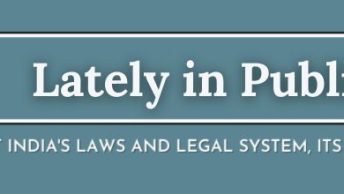A fortnightly feature inspired by I-CONnect’s weekly “What’s New in Public Law” feature that addresses the lacuna of a one-stop-shop public law newsletter in the Indian legal space.
What’s new at LAOT:-
1 Taking the Constitution to the People: Conversations on Hum Bharat Ke Log with Prof. Tarunabh Khaitan and Surbhi Karwa (A conversation exploring how the book reframes constitutionalism as a people-centric project and the challenges of translating constitutional values into democratic practice)
2 From Gametes to Guardianship: The Legal Complexities of Posthumous Reproduction (Analyzes the ethical and legal puzzles surrounding posthumous conception—parental consent, inheritance, guardianship, and India’s regulatory gaps.)
3 Indian Constitution: A Conversation with Power with Dr. Gautam Bhatia (A deep dive into constitutionalism as a theory of power, probing its limits, failures, and emancipatory possibilities in the Indian context)
Elsewhere Online
1 Prakhar, Missed Opportunities and Active Omissions in Jane Kaushik: A Queer Legal Methods Perspective, Constitutional Law and Philosophy Blog
2 Aman Chain, Customary Law, Gender Equality and the Idea of a Constitutional Default: Analysing the Supreme Court’s Judgment in Ram Charan – CL&P Blog
3 Tejaswini Kaushal and Srija Singh, Delimitation and Gerrymandering in India, Vidhi Legal Policy Blog
4 Harsh Gaur, Adolescents, Sexual Choices & the POCSO Act , Vidhi Legal Policy Blog
5 Aniket Aga, Bihar’s New Voter Rolls Raise More Questions, Article 14
6 Dale Smith, A Constitution Without Consultation, CBA/ABC National Magazine
Listen Up
1. The Court and the Republic: A Conversation with Justice D.Y. Chandrachud, Grand Tamasha Podcast. (This episode explores the evolution of the Supreme Court’s role in shaping India’s democratic institutions. Justice Chandrachud reflects on judicial review, constitutional ideals, and the Court’s responsibilities in turbulent political moments.
2. Asad Tariq on Electoral Redistricting and Public Goods Provision in India, Ideas of India Podcast on Spotify (Asad Tariq discusses how constituency design affects development outcomes and political incentives. The conversation breaks down India’s redistricting challenges and its democratic implications.)
3. Supreme Court Quashes ‘Mass Conversion’ FIRs: What It Means for Anti-Conversion Laws – In Focus by The Hindu (This episode analyses the Supreme Court’s ruling striking down mass FIRs under anti-conversion laws. It explains the judgment’s impact on religious freedom, state powers, and ground-level policing)
Lately in Academic Articles:
1 Sambaiah Gundimeda, Debating Uniform Civil Code: the making of Article 44 in the Constituent Assembly of India, Indian Law Review. (A historical reconstruction of how Article 44 emerged as a compromise between equality, secularism, and cultural autonomy. The piece argues that meaningful personal law reform must be rooted in inclusive deliberation.)
2. KN Chandrasekharan Pillai & NS Gopalakrishnan, Revisiting the law relating to remission of jail sentences: a critique of Bilkis Yakub Rasool v Union of India, Indian Law Review. (A sharp critique of the Supreme Court’s 2024 decision, examining “appropriate government” under the CrPC, the interplay with transferred trials, and the fallout of Radheshyam Bhagwandas Shah..)
3. Aisarya Dutt Roy, Perils of Law: Trans Subjectivities at the Limits of Legality, Economic and Political Weekly. (Moves beyond Navtej to interrogate how NALSA and the 2020 Rules produce state-constructed trans identities, juxtaposed with activist critiques.)
4. Amita Kumari, Customary Laws and Courts: Negotiating Adivasi Women’s Property Rights, Economic and Political Weekly. (Explores Santal customs and the declining acceptance of ghar jawae marriage, showing how legal and social changes have narrowed pathways for women’s ownership.)
5. Swapnil Tripathi, Anshul Dalmia, Aditya Prasanna Bhattacharya, Report on The Constitution (One Hundred and Thirtieth Amendment) Bill, 2025: History, Constitutionality, and Suggestions. Vidhi Legal Policy. (A detailed analysis spotlighting constitutional vulnerabilities, definitional gaps, and reform suggestions aligned with debates, precedents, and Law Commission reports.)
6. Teresa Lancry A. S. Robalo, Cheng Hang Leong, and João Ilhão Moreira, Experiences in Bilingual Legal Education: The Case of Macau SAR’s Chinese–Portuguese Bachelor of Law. Asian Journal of Legal Education. (A data-driven evaluation of Macau’s dual-language legal programme, highlighting proficiency gains, pandemic disruptions, and the success of 99 bilingual graduates.)
7. Richard Albert, How Constitutions Die, Florida Law Review. (Outlines three models of constitutional time to explain how constitutions endure or restart and to explore what is revealed about America’s constitutional lifespan and prospects for reform.)
8. Anubhav Kumar and Neha Tripathi, The Conundrum of Manifest Arbitrariness And Legislature’s Intent: An Inquiry, Comparative Constitutional Law and Administrative Law Journal. (Critiques the rise of “manifest arbitrariness” and argues that its expanded use in reviewing legislation risks distorting equality principles and upsetting the judiciary-legislature balance.)
Opportunities and other things
1. Call for papers by GNLU Centre for Research in Criminal Justice Sciences (GCRCJS) International Conference on Criminal Law. The last date for submitting abstracts is November 20, 2025.
2. Call for abstracts by NUALS Kochi for an online conference titled “Healthcare and Gender Justice: Perspectives on Contemporary Issues”. The last date for submitting abstracts is November 20, 2025.
3. Call for submissions by NLU Jodhpur’s Comparative Constitutional Law and Administrative Law Journal. The last date for submissions is December 9th, 2025.
4. Call for papers by GNLU Student Law Review Volume VII. The last date. The last date for submissions is December 25th, 2025.
5. Call for submissions for NLUD Journal for Legal Studies Volume VIII. Submissions are accepted on a rolling basis.
This edition has been prepared by the LAOT team composed of Hansika, Nida, Saloni led by Jeetendra. Nividita managed the social media outreach. The newsletter is published under the guidance of Surbhi Karwa and Anubhav Kumar from the senior editorial board.



